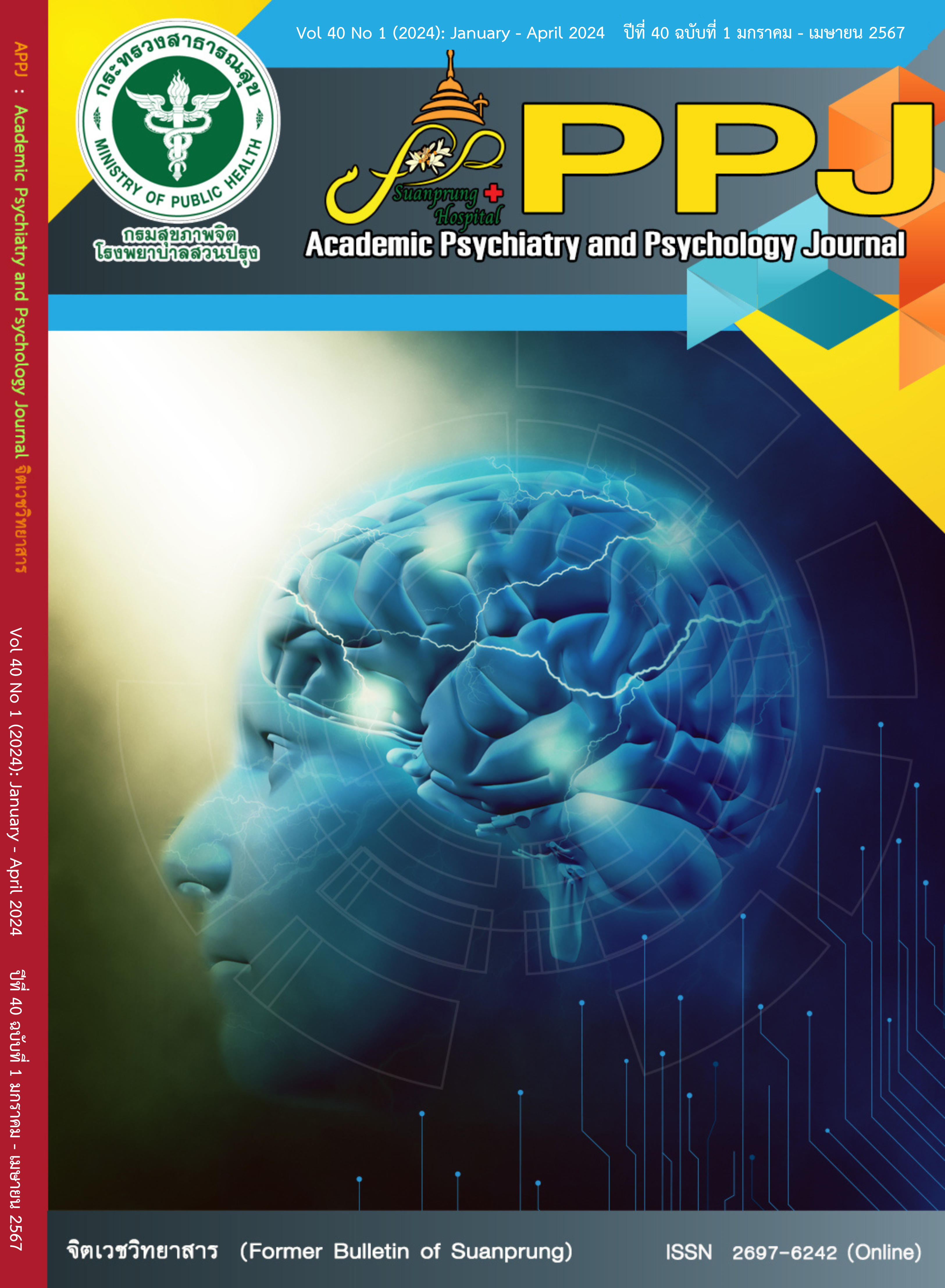Caring for Serious Mental Illness Patients with High Risk of Committing Violence by Using Case Management: A Case Study
Main Article Content
Abstract
Case management is a collaborative process for quality services to address a patient’s and family’s needs in a cost-effective and safe manner to promote optimal outcomes. The patient in this study poses a high risk for violence and lacks a direct caregiver. Community members are afraid of the patient's violent behaviors, and the hospital responsible for caring for the patient is
a community hospital without a specialist in psychiatry. This article aims to explain the case management process using clinical resource management models in caring for patients with complex problems in community hospitals. The community hospital has limited potential to provide total and holistic care by experts and network associates, which affects other departments within the same context. The integration of SMI-V into the care process results in ongoing care at community hospitals, with network associates involved in caring, planning, and system management. As a result, the patient in this case had no hospital readmissions within two years, and there were no recurrences of violence in the community. The patient, family, and the healthcare provider team were all satisfied with the case management process.
Article Details

This work is licensed under a Creative Commons Attribution-NonCommercial-NoDerivatives 4.0 International License.
บทความหลังผ่านการปรับแก้จากกองบรรณาธิการแล้ว เป็นลิขสิทธ์ของวารสารจิตเวชวิทยาสาร โรงพยาบาลสวนปรุง กรมสุขภาพจิต กระทรวงสาธารณสุข ห้ามเผยแพร่เพื่อประโยชน์ทางการค้าโดยไม่ได้รับอนุญาต แต่อนุญาตให้เผยแพร่บทความดังกล่าวเพื่อประโยชน์ทางการศึกษาแก่ประชาชนทั่วไป ทั้งนี้กองบรรณาธิการไม่จำเป็นต้องเห็นด้วยกับบทความหรือข้อคิดเห็นใดๆ ที่ปรากฏในวารสารสวนปรุง
References
Aiamsaart N, Thaweeses P, Chumchai P. The effect of case management to overall abilities
among schizophrenic patients with the risk for violence. Journal of Somdet Chaopraya Institute of Psychiatry. 2020; 14: 10-22. (in Thai).
Department of Mental Health. Serious Mental Illness with High Risk to Violence: SMI-V. 2023. Retrieved from http://data.go.th/dataset/smi-v-1-2558-28-2563.
Department of Mental Health. Handbook of care systems for psychiatric patients at high risk of violence for institutions and hospitals under the department of mental health. Nonthaburi: Prosperous Plus Company Limited; 2020. (in Thai).
Takviriyanun N. Nursing care of people receiving psychiatric drugs. Bangkok: Thammasat University Press 2015. (in Thai).
Maneeganon S, Arunponpaisal S, Pimpanit V, Jarassaeng N, Boontoch K. Prevalence of substance use in psychiatric outpatient clinic at srinagarind hospital. Journal of The Psychiatric Association of Thailand. 2014; 59: 371-80. (in Thai).
Srireunthong W, Kongsuk T, Sukhawaha S, Lodthanong S, Leejongpermpool J. Development of
violence severity scale in serious mental illness. Journal of The Psychiatric Association of
Thailand. 2016; 61: 253-66. (in Thai).
Gelkopf M, Lapid L, Werbeloff N, Levine SZ, Telem A, Zisman-Ilani Y, Roe D. A strengths-based case management service for people with serious mental illness in Israel: A randomized controlled trial. Psychiatry Res. 2016; 30: 241: 182-9.
Piboonarluk W, Yunibhand J, Pouwkantarakorn W, Unharasamee W. The Effect of Case Management by Advanced Practice Nurse on Relapse in Persons with Schizophrenia. Thai Journal of Nursing and Midwifery Practice. 2018; 5: 5-18. (in Thai).
Pragodpol P. Nursing Care Manager for Chronic Disease. Journal of Phrapokklao Nursing College. 2017; 28: 112-21. (in Thai).
Sindhu S. Case Management for High Cost Chronic Illness. 2nd ed. Bangkok: Wattana Printing 2018. (in Thai).
Panomsert C. The effect of case management on re-admission of schizophrenia patients at Surin Hospital. 2009; 24: 107-16. (in Thai).
Thadsri w. The Application of case management in complex schizophrenia patients: inpatient psychiatric ward, Surin hospital. Medical Journal of Srisaket Surin Burirum Hospitals. 2016; 25: 173-84. (in Thai).
Hemarat K, Siengchokyoo P, Khunarak U, Panasuna N. Effects of Case Management in Schizophrenic Patients on Medication Compliance and Relapse. The Journal of Psychiatric Nursing and Mental Health. 2012; 26: 63-73. (in Thai).
Chen M, Wu G, Wang Z, Yan J, Zhou J, Ding Y, Jiang Y, Rao S, Zhou Q, Ni H, Zhao J, Su Y, Hu J, Zhang Y, Yi Z, Yang W, Song L. Two-year prospective case-controlled study of a case management program for community-dwelling individuals with schizophrenia. Shanghai Arch Psychiatry. 2014; 26: 119-28.
Surapongpiwatana K. The Effect of Case Management: Hospital and Community-Based Model in Schizophrenic Patients. Medical Journal of Srisaket Surin Burirum Hospitals. 2016; 24: 111-19. (in Thai).
Jaroensan J, Chaichumni N. The development of psychosocial rehabilitation case management model for complicated schizophrenia patients. The Journal of Psychiatric Nursing and Mental Health. 2017; 31: 64-77. (in Thai).
Cheng J, Liu HC, Geng T, Wang Y, Yu L, Li JJ, et al. The Effect of Case Management for Schizophrenia Clients in China. Journal of Behavioral and Brain Science. 2020; 10: 297-310.
Sriharaksa P. Caring for schizophrenic patients at risk of violence through the use of participatory case management in the community Muang District, Sakon Nakhon Province: A case study of Khamin Subdistrict, Mueang District, Sakon Nakhon Province. Journal of Health and Environmental Education. 2023; 8: 436-47. (in Thai).
Case Management Society of America. Standards of practice for case management. Arkansas: CMSA, 2016.
Tangmanokun A, Chaiyasong S. Outcomes of Home Health Care in Patients with Schizophrenia by Multidisciplinary Team of Donmoddaeng District Health Service Network in Ubonratchathani. Journal of Health Systems Research. 2021; 15: 436-55.
(in Thai).
National Health Security Office. Manual care of chronic schizophrenia patients by the community for primary healthcare providers 2016. Bangkok: Saeng Chan Press Limited Partnership. (in Thai).

